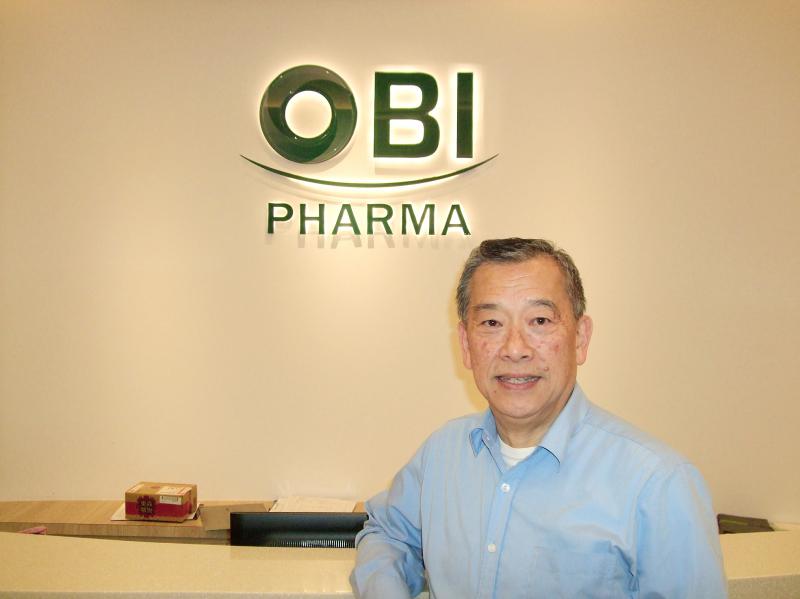OBI Pharma Inc (浩鼎生技) has signed an agreement with Odeon Therapeutics (Hong Kong) Ltd (康騰浩諾香港生物科技) to give it the rights to two of its experimental drugs, OBI-833 and OBI-999, in China, OBI said on Tuesday.
OBI would receive US$200 million for the licensing of the cancer drugs, which includes US$12 million in newly issued Odeon shares as a signing payment, and US$188 million as development and commercialization milestone payments, the Taipei-based company said in a regulatory filing.
The drug developer would also receive double-digit percentage royalties on Odeon’s net sales of the two drugs after they are approved in China, it said.

Photo: Chen Yung-chi, Taipei Times
OBI granted Odeon exclusive rights to further develop, register and commercialize OBI-999 and OBI-833, it said, adding that the deal also includes Hong Kong and Macau.
Odeon would be responsible for all development costs, as well as subsequent regulatory and commercialization costs, it added.
The Ministry of Economic Affairs’ Investment Commission has approved the deal, OBI said.
As China’s cancer treatment market has great potential for growth, OBI and Odeon are planning to press ahead with the research and sale of the two drugs, aiming to share the commercial benefits, the filing said.
OBI-833 and OBI-999 are experimental drugs targeting Globo H, a tumor antigen that has been detected in up to 15 different cancers and has been reported to play an important role in tumor progression.
OBI-833 is a therapeutic cancer vaccine consisting of a synthetic Globo H antigen, while OBI-999 is a novel antibody drug conjugate using a Globo H antibody to target cancer cells with high Globo H expression.
“Odeon looks forward to working closely with OBI to bring these new treatment options to patients in China,” OBI chief executive officer Tim Xiao (肖汀) said in a statement.
OBI-999 has completed phase 1 trials in the US, showing excellent safety and pharmacokinetics, while OBI-333 also demonstrated great potential as an immune-oncology therapeutic vaccine, Xiao said.
OBI said that it gained local approval to conduct phase 2 clinical trial for OBI-333, expecting primary endpoint evaluation in 2024.

GROWING OWINGS: While Luxembourg and China swapped the top three spots, the US continued to be the largest exposure for Taiwan for the 41st consecutive quarter The US remained the largest debtor nation to Taiwan’s banking sector for the 41st consecutive quarter at the end of September, after local banks’ exposure to the US market rose more than 2 percent from three months earlier, the central bank said. Exposure to the US increased to US$198.896 billion, up US$4.026 billion, or 2.07 percent, from US$194.87 billion in the previous quarter, data released by the central bank showed on Friday. Of the increase, about US$1.4 billion came from banks’ investments in securitized products and interbank loans in the US, while another US$2.6 billion stemmed from trust assets, including mutual funds,

Micron Memory Taiwan Co (台灣美光), a subsidiary of US memorychip maker Micron Technology Inc, has been granted a NT$4.7 billion (US$149.5 million) subsidy under the Ministry of Economic Affairs A+ Corporate Innovation and R&D Enhancement program, the ministry said yesterday. The US memorychip maker’s program aims to back the development of high-performance and high-bandwidth memory chips with a total budget of NT$11.75 billion, the ministry said. Aside from the government funding, Micron is to inject the remaining investment of NT$7.06 billion as the company applied to participate the government’s Global Innovation Partnership Program to deepen technology cooperation, a ministry official told the

Taiwan Semiconductor Manufacturing Co (TSMC, 台積電), the world’s leading advanced chipmaker, officially began volume production of its 2-nanometer chips in the fourth quarter of this year, according to a recent update on the company’s Web site. The low-key announcement confirms that TSMC, the go-to chipmaker for artificial intelligence (AI) hardware providers Nvidia Corp and iPhone maker Apple Inc, met its original roadmap for the next-generation technology. Production is currently centered at Fab 22 in Kaohsiung, utilizing the company’s first-generation nanosheet transistor technology. The new architecture achieves “full-node strides in performance and power consumption,” TSMC said. The company described the 2nm process as

Even as the US is embarked on a bitter rivalry with China over the deployment of artificial intelligence (AI), Chinese technology is quietly making inroads into the US market. Despite considerable geopolitical tensions, Chinese open-source AI models are winning over a growing number of programmers and companies in the US. These are different from the closed generative AI models that have become household names — ChatGPT-maker OpenAI or Google’s Gemini — whose inner workings are fiercely protected. In contrast, “open” models offered by many Chinese rivals, from Alibaba (阿里巴巴) to DeepSeek (深度求索), allow programmers to customize parts of the software to suit their